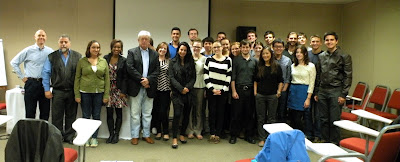 |
| The class above with the SubSecretary! |
There are 3 main pillars 1. Biofuels 2. Wind 3. Solar. We were informed that Sao Paulo is maxed out for hydraulic power and gains can only now come from solar and wind. To track investment, SP offers 31 airports, 5,000 km of railways and 35000km of paved roads for its citizens. There are obviously many differences between Brazil and the U.S.'s renewable energy programs, the largest being amount as I mentioned above. Both countries however offer tax incentives to companies and people who use these alternative forms of technology. SP also is a heavy producer of sugarcane, producing 18% worldwide. 50% is used for food and food products and the other half is used for fuels. The leftovers from the sugarcane are also used for biofuel and the production of ethanol. In terms of wind generation, SP currently has no sites however SP has 66% of the industry for that renewable energy. An interesting comment made by the commissioner was that he uses the U.S. as a warning for Brazil to no serve the path of fracking. Other than fracking, SP imports its natural gas from Bolivia.
Brazil has many goals for the coming years. These include to increase the amount of renewable energies, continue to expand the economy, create tax structures to make investments attractive and to adhere to the federal governments 5 year budget projection program.
No comments:
Post a Comment